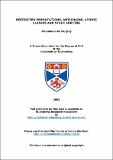Files in this item
Restricted permutations, antichains, atomic classes and stack sorting
Item metadata
| dc.contributor.advisor | Ruskuc, Nik | |
| dc.contributor.author | Murphy, Maximilian M. | |
| dc.coverage.spatial | 360 p. | en_US |
| dc.date.accessioned | 2017-06-19T13:10:42Z | |
| dc.date.available | 2017-06-19T13:10:42Z | |
| dc.date.issued | 2003 | |
| dc.identifier | uk.bl.ethos.527125 | |
| dc.identifier.uri | https://hdl.handle.net/10023/11023 | |
| dc.description.abstract | Involvement is a partial order on all finite permutations, of infinite dimension and having subsets isomorphic to every countable partial order with finite descending chains. It has attracted the attention of some celebrated mathematicians including Paul Erdős and, due to its close links with sorting devices, Donald Knuth. We compare and contrast two presentations of closed classes that depend on the partial order of involvement: Basis or Avoidance Set, and Union of Atomic Classes. We examine how the basis is affected by a comprehensive list of closed class constructions and decompositions. The partial order of involvement contains infinite antichains. We develop the concept of a fundamental antichain. We compare the concept of 'fundamental' with other definitions of minimality for antichains, and compare fundamental permutation antichains with fundamental antichains in graph theory. The justification for investigating fundamental antichains is the nice patterns they produce. We forward the case for classifying the fundamental permutation antichains. Sorting devices have close links with closed classes. We consider two sorting devices, constructed from stacks in series, in detail. We give a comment on an enumerative conjecture by Ira Gessel. We demonstrate, with a remarkable example, that there exist two closed classes, equinumerous, one of which has a single basis element, the other infinitely many basis elements. We present this paper as a comprehensive analysis of the partial order of permutation involvement. We regard the main research contributions offered here to be the examples that demonstrate what is, and what is not, possible; although there are numerous structure results that do not fall under this category. We propose the classification of fundamental permutation antichains as one of the principal problems for closed classes today, and consider this as a problem whose solution will have wide significance for the study of partial orders, and mathematics as a whole. | en_US |
| dc.language.iso | en | en_US |
| dc.publisher | University of St Andrews | |
| dc.subject.lcc | QA171.C2M9 | |
| dc.subject.lcsh | Group theory | en |
| dc.subject.lcsh | Permutations | en |
| dc.title | Restricted permutations, antichains, atomic classes and stack sorting | en_US |
| dc.type | Thesis | en_US |
| dc.type.qualificationlevel | Doctoral | en_US |
| dc.type.qualificationname | PhD Doctor of Philosophy | en_US |
| dc.publisher.institution | The University of St Andrews | en_US |
This item appears in the following Collection(s)
Items in the St Andrews Research Repository are protected by copyright, with all rights reserved, unless otherwise indicated.

